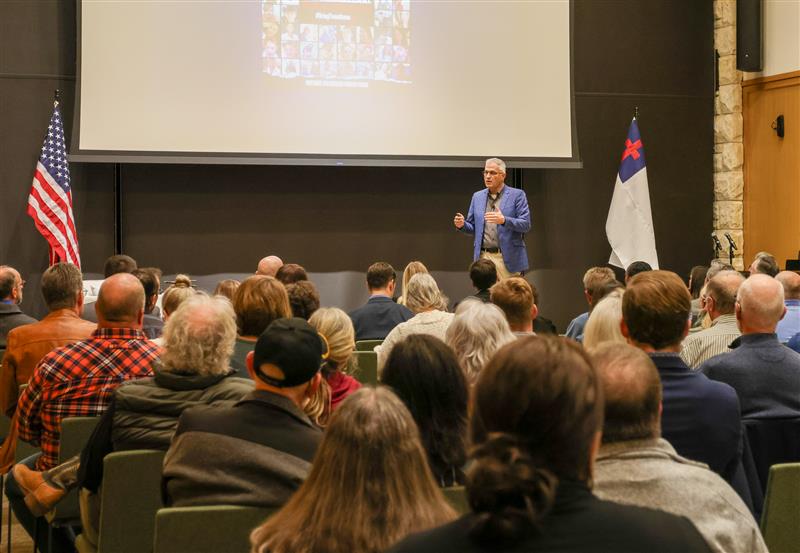‘They don’t know anything about this conflict or the history.’ IDF veteran sets Hamas attacks in context in briefing
A briefing on the unfolding war between Israel and Hamas was hosted last week by The Herzog Foundation, which publishes The Lion.
Guest speaker Uri Goldflam, a former Israel Defense Force veteran…

A briefing on the unfolding war between Israel and Hamas was hosted last week by The Herzog Foundation, which publishes The Lion.
Guest speaker Uri Goldflam, a former Israel Defense Force veteran who works as a tour guide for Travel Trailer Israel, spoke for more than an hour about his firsthand experience of what took place, also setting recent events in their historical context.
The briefing comes in the light of an educational crisis within American higher education: 51% of Gen Z, who make up a majority of college students, believe that Hamas’ Oct. 7 attack against Israel could be justified as a grievance of Palestinians, whereas the vast majority of Americans age 35+ disagree with any such notion.
Following the attack, student groups from schools across the country came out with pro-Hamas statements, such as Yale University, Northwestern University, Boston University, City University of New York, Swathmore College, Stanford University, New York University School of Law, and University of Virginia, among others.
“They’re going to come back with lots of strange ideas,” said Goldflam, referencing college students set to return for Thanksgiving.
“When your children come home from college next week, please talk to them. They don’t know anything about this conflict or the history.”
Thus Goldflam began his briefing by discussing the history of conflict, going all the way back to Israel’s founding in 1948. He surveyed several key events, including Israel’s War of Independence, the Yom Kippur War, the 1979 peace agreement between Israel and Egypt, the Oslo Accords of 1993, the Second Intifada in 2000, Israel’s withdrawal from the West Bank in 2005, and Hamas’ election to power in 2006.
With the historical context set, Goldflam shared the single most important reason why a two-state solution between the Palestinians and Israel has not happened: jihad makes it impossible.
“We in the West lack the language to deal with the concept of jihad,” he explained. “For the Muslim fundamentalist, who believes in jihad as a way of life, as the sublime belief – death is only the beginning. Our bodies, our presence here on this earth, is a tiny, tiny portion of the real deal, of the real life – the eternal life … it’s better to die quickly and get to heaven so you can start your eternal life with the Prophet and Allah.”
Hamas has one goal, he noted, citing Hamas’ own charter: the destruction of Israel.
“For Hamas, there’s no negotiation, there’s no compromise. And there’s no reality in this world where there are Jews, non-Islamist, who are controlling the land, [which] they believe is Islamic land.”
And while some Israelis have held out hope for peace for many years, the tide has changed. As a result of the massacre on Oct. 7, many Israelis now believe the current conflict is an “existential war,” Goldflam said. “If it happened once, it can happen again, and Israel will no longer be able to exist.”
Goldflam also spent time addressing some of the misinformation surrounding the war, including the claim that Hamas is not representative of the people living in Gaza.
“Hamas as an organization grew up as part and parcel of Palestinian society,” he said. “Somebody had to teach the 3- and 4- and 5-year-old child to grow up with a path of Allah, on the road to Jerusalem, to achieve redemption with killing Jews … It’s a whole culture that gave rise to this jihadi way of thinking. Remember, 75% of Palestinians voted for Hamas in 2006.”
Indeed, Hamas still continues to have positive approval ratings.
A recent survey conducted by the Arab World for Research and Development found that 76% of residents living in Gaza and the West Bank hold either a “very positive” or “somewhat positive” view of the group.
“It’s not obvious at all that there is a clear distinction between Hamas and the rest of a peaceful Palestinian population,” Goldflam said. “If there is a distinction, the evidence is lacking.”
The same survey found that 75% of the respondents want to see “a Palestinian state from ‘the river to the sea,’” a slogan Goldflam believes is genocidal.
“I live in the hills of Jerusalem, between the river and the sea. ‘Between the river and the sea, Palestine will be free,’” Goldflam recited.
“‘Free of’ – what you can say?” he asked, rhetorically. “Jews. Free of Jews.”
The actions of Hamas speak for themselves, he explained:
“Hamas terrorists sent thousands of their numbers into Israel, went on a rampage of rape, dismemberment, beheading, including children. They killed children in front of their parents and parents in front of their children. They chopped them to bits while they were still alive.”
The events of Oct. 7 were traumatizing for Jewish people, Goldflam added, encouraging the audience to support their Jewish friends, neighbors and colleagues.
“Call them. Send them a text. Ask them how they’re doing,” he exhorted. “Can you do anything? They’re not going to ask you anything. They’re just going to appreciate your call. Tell them you have their back. Tell them you’re in their corner. Tell them you feel for them. Because they feel it’s 1939.”



